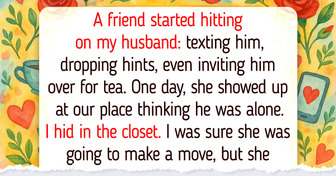Wow, I'm more sad that you raised a child who treated you like that. I sacrificed loads for my birth pod when she had cancer, she asked me for money and I told her no, she stormed off screaming that I was the worse mistake she ever made. When she died, it was a weight off my shoulders and no she didn't leave any money so I had to pay for her funeral.
I’m Not Delaying My Retirement for My Sick Daughter — I’m Done Being Her Cash Cow
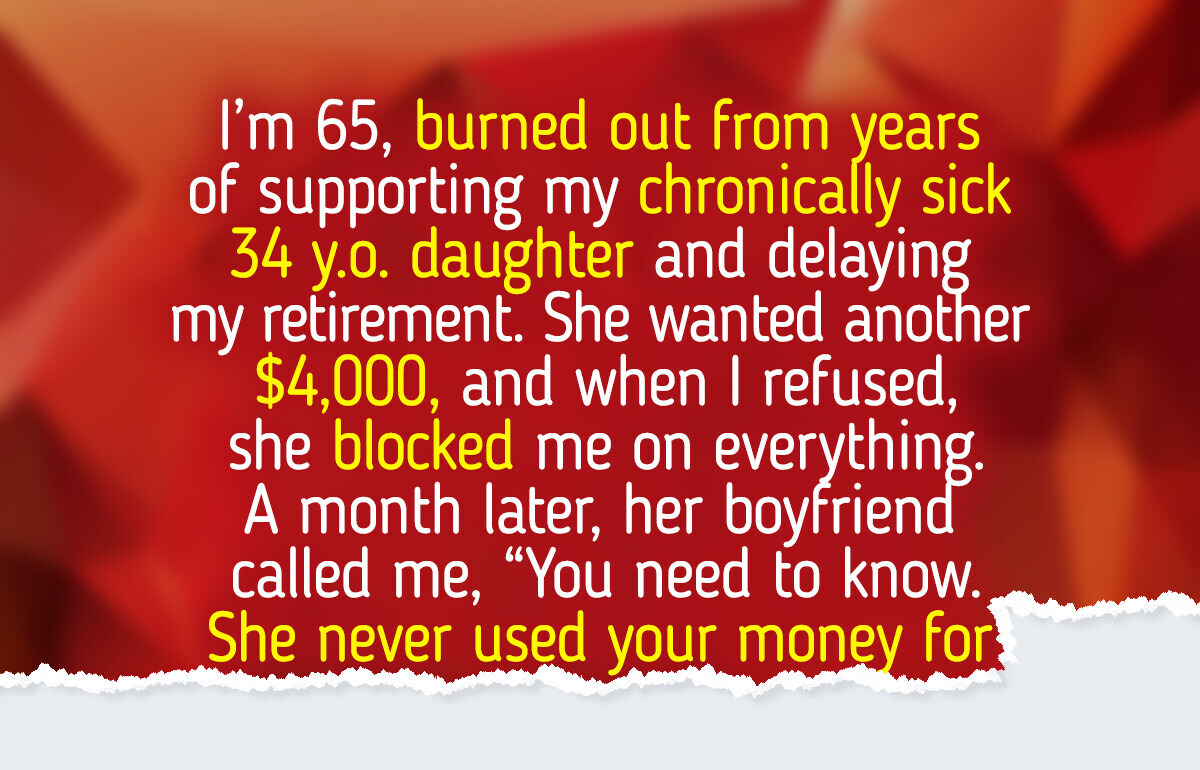
One of our readers recently shared a story about finally standing up to her adult daughter after years of financial pressure. She told us she never expected a single “no” to turn her whole family dynamic upside down. Here’s her letter.
The letter with her own words:

Hi Bright Side team!
I never imagined I’d reach a point where I’d say “no” to my own child. But here I am — 65 years old, exhausted, and ready to retire, and my daughter is furious with me because I won’t delay it again to bail her out financially.
My daughter, Emma, is 34. She’s been chronically ill for the last three years, and I’ve supported her through every appointment, every treatment, every emergency bill. I’ve drained half my savings, taken on extra part-time work, postponed vacations, sold my jewellery, and put off my retirement twice.
And she’s gotten used to it.
Everyone has — including me.
But last month, something inside me snapped.
Emma called, crying, because she needed another $4,000 for a specialist. She didn’t even ask if I could. She said, “Mom, I need you to handle this.” Like it was a subscription service.
What she didn’t know was that I had just come back from my own doctor’s appointment. My blood pressure is high. My knees are failing. I’m tired in a way that doesn’t go away with sleep. My doctor told me I needed to slow down or I’d “retire from life before retiring from work.”
I told Emma I couldn’t pay. Not this time.
There was silence, then she blew up. Told me I was “abandoning her in her darkest hour,” accused me of being selfish, and hung up before I could explain anything. An hour later I found out she’d blocked me everywhere. Calls, texts, socials — gone. My own kid cut me off because I finally said no.
A month of total silence followed. No updates, no apology, nothing. I tried to convince myself she needed space, but honestly? The silence hurt worse than the yelling.
Then out of nowhere, a random number called. It was her boyfriend. He said, “She told me not to call you, but you need to know what’s going on.”
And then he dropped the bomb:
“Emma never used your money for medical bills. Not once.”
I literally felt sick.
He went on: “She’s been spending it on expensive stuff. New gadgets, clothes, subscription boxes... things she doesn’t want you to know about. She says it makes her feel normal. But it’s gotten bad. She freaked out when you said no because she couldn’t hide it anymore.”
I just sat there realizing how much I’d sacrificed — extra shifts, delaying my own doctor visits, draining my retirement — thinking I was helping her survive, not fund shopping sprees.
I wasn’t even angry at first. Mostly just heartbroken that this is what it came to... and that I’d been enabling it without even knowing.
Agata
Thank you for your letter, Agata!
Psychological insight of caregiving

Therapists say long-term caregiving can quietly turn into a one-sided setup where one person always gives and the other always receives. When that pattern goes on long enough, setting a boundary can feel cruel — even though it isn’t. Boundaries actually keep relationships functional.
Parents also carry a lot of guilt when they stop fixing their adult children’s problems, but studies show that stepping in too much just keeps everyone stuck. Letting grown kids handle their own lives can be the healthiest move for both sides.
Some tips for caregivers

I'm glad the boyfriend called you and told you what she was really spending the money on your daughter should be ashamed of herself treating you like that and lying to you like that that's messed up now you can confront your daughter about it I hope you do and make her feel like shit instead of you putting all this stress on your heart and be making it harder on you for the medical that you need
If you’ve been pouring all your energy into someone else and feel completely drained, it’s okay to pause. You’re allowed to ask yourself what you need. Setting limits with a loved one isn’t cold or uncaring — it’s how you keep the relationship healthy. When boundaries are communicated calmly and honestly, guilt often turns into clarity, and caregiving becomes something shared instead of something that falls entirely on one person.
Creating boundaries doesn’t mean you’re pulling away; it means you want to stay well enough to keep showing up without burning out. Protecting your time, energy, and mental health prevents resentment and keeps the connection intact. Taking care of yourself isn’t selfish — it’s part of responsible caregiving.
If balance feels impossible, a counselor or caregiving specialist can offer tools to communicate without conflict and support you emotionally while you navigate tough conversations.
What can help:
• Focus on the pattern, not the person.
Swap “You never appreciate me” with “We’ve slipped into a dynamic where I overextend, and it’s not sustainable.” It encourages discussion, not defensiveness.
• Redefine what support looks like.
Help doesn’t have to be money or nonstop availability. Emotional support, help finding resources, or guiding them through paperwork can be just as meaningful.
• Expect some guilt.
Feeling guilty doesn’t mean you’re wrong — it means you care. Guilt fades as healthier habits form.
• Model healthy independence.
Show your adult child or relative that boundaries and self-care are normal life skills, not rejection.
• Bring in a neutral third party if needed.
A therapist or mediator can turn “I can’t keep fixing everything for you” into “I believe you’re capable of handling this, and I’ll support you in appropriate ways.”
Saying no after a lifetime of yes doesn’t make you cold — it means you’re finally giving love the space to grow up.
13 People That Posted Family Photos and the Internet Said: “Oh, This Is Gold!”
Comments
BRIGHT SIDE, PLEASE STOP RECYCLING THESE SAME STORIES, OVER AND OVER. EVEN the name of the OP is almost identical. You only added a boyfriend to this story, and a few medical issues with the OP. We all like reading and responding to them , but COME ON. This isn't even plagiarism, it's LAZINESS. Get something new for us to read.
Related Reads
I Refuse to Let My Daughter Treat My Home Like Her Business, I’m Not Her Personal Maid
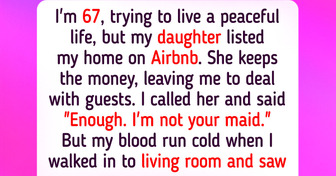
I Turned My Adult Daughter Away at My Door, She Needed to Hear “No”
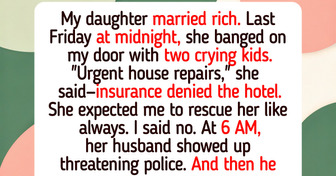
20 Job Interviews That Went Off Script and Ended in the Most Unexpected Way
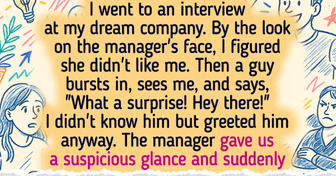
My Toxic Coworker Spread Lies About Me and Got Me Demoted—but I Got the Ultimate Victory
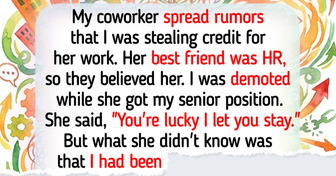
18 Moments That Remind Us Kindness Takes Minutes but Stays Forever
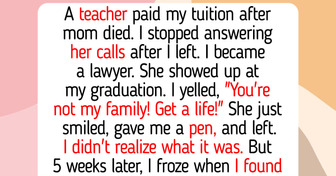
I Refused to Watch My DIL Give Birth— She Made Sure I Regretted That Moment
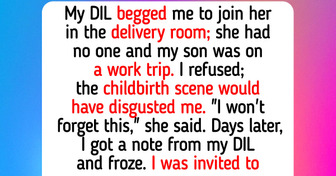
15 Moments That Show Quiet Kindness Keeps the World From Falling Apart
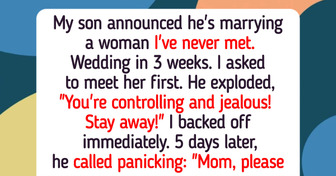
I Refuse to Pay for a Steakhouse Party as a Vegan—Then Got HR Involved
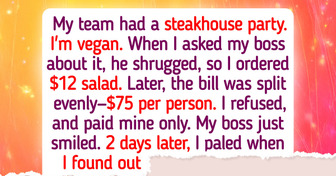
I Got Fired for Refusing to Let My Boss Humiliate Me in Front of Everyone
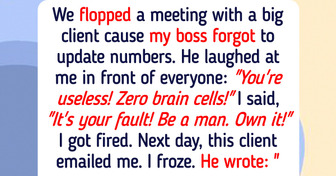
10 Moments That Prove Kindness Prevails Even in an Unfair World
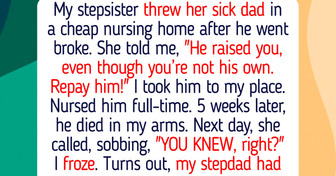
I Refused to Be Called the Office Villain by a Coworker Who Barely Works
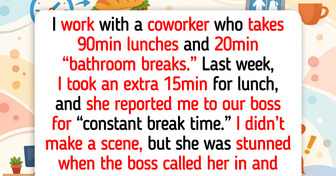
14 Friends Who Have a Black Belt in Creating Awkward Situations
